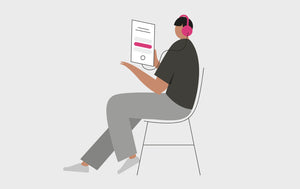The Ultimate Guide to Buying Hearing Aids Online
Hearing Direct’s Senior Hearing Aid audiologist Bev Carter shares her ultimate guide on buying hearing aids online.
As household budgets continue to be squeezed, many people are cutting back on unnecessary expenses and searching for cheaper alternatives, even when it comes to products and services for their health and wellbeing.
Hearing aids are now readily available at the click of a button, but purchasing online can be daunting, particularly for people who have not done it before.
Research shows that hearing loss can increase feelings of loneliness and social isolation, it is vital that nobody with hearing loss struggles in silence. Thankfully, there are a lot of affordable hearing aids on the market, especially when you look online.
1. Research before you buy
Research is essential before deciding which hearing aids to buy. Make sure you look at a variety of websites and different brands so that you can fully understand the range of products that are available. There is some fantastic technology available, such as Bluetooth hearing aids that can connect to your mobile phone and TV streaming devices that can support you with hearing loss.

2. Talk to a hearing aid audiologist
Try to find brands that give you access to an audiologist, rather than just acting as an online marketplace for hearing aids without any genuine interaction. The best online retailers will offer virtual assistance with help and guidance from a hearing aid audiologist. You could pair this with some offline research too and look at some items in real life so that you know what you’re getting from your online purchase. This will also help you to compare prices and see the potential cost savings available when you buy directly.
3. Choose the right fit
There are many factors that affect how well your hearing aids will fit, from different product types and sizes to the dexterity of the user. Everyone’s ears are different shapes and sizes, but there is sure to be a hearing aid to fit your unique needs. Our resident hearing aid audiologist Bev recommends booking in a video call, which not only provides a more personal experience but also enables the audiologist to understand how mobile the person is, so that she can recommend the best product fit for them. For example, if you struggle to handle small objects, a rechargeable hearing aid might be a better match for you than one with tiny batteries that need changing regularly. You can also choose from invisible hearing aids to behind the ear hearing aids.
Once you have decided on the product, it needs to be programmed precisely to suit your lifestyle and needs. If you are planning on wearing it in social settings, the right programming can help you to focus on conversations and reduce the volume of background noise. Similarly, if you mainly use your hearing aid at home, for activities like watching TV, the programming can be adjusted accordingly.
4. Involve family or friends
It’s always a good idea to speak to a family member or friend about your hearing loss and involve them in the process of buying hearing aids. Family members often notice missed conversations more than the person themselves, and these insights can be invaluable when deciding on the best products to meet the user’s needs.
5. Get used to the hearing aids
Hearing aids should be programmed precisely to suit your needs and lifestyle. I often refer to this as a rehabilitation journey, as clients need close care and support in those crucial first weeks and months of wearing their hearing aids. You should avoid buying from a site that doesn’t offer aftercare, as this is a key step in fine-tuning your devices and making sure you are getting the most out of them. If you skip this step, you are likely to be left with below satisfactory hearing aids that you probably won’t wear, no matter how good the actual device is. This can be an incredibly costly mistake, not to mention demoralising.
6. Some hearing aids require an audiogram
You will find that some hearing aid brands such as Phonak, require you to have an audiogram. If this is the first time you’re having a hearing check, I would advise you to first visit an audiologist in person so you can build a full picture of your needs and preferences first. They will provide you with an audiogram which you can later use to purchase your hearing aids online. On the other side, brand like Signia makes it easy to purchase your desired hearing aids online without an audiogram.
Top 3 product recommendations for people buying hearing aids online:
RRP £298.00 each | £498.00 per pair
Suitable for all budgets with three price categories. In-ear design which is small and discreet. Easy to use and controlled via a smartphone app.
RRP £449.00 each | £748.00 per pair
Particularly suited to elderly wearers who require a simple but effective model. Easy to use with remote control for volume adjustments.
RRP £1,595.00 each | £2,895.00 per pair
Top end of the market with an award-winning design. Rechargeable with Bluetooth connectivity and remote control. Delivers outstanding speech clarity.
If you, or anyone you’re close to, is struggling with hearing, ear health or to understand what is available in the market and would welcome some free, impartial advice. Please feel free to give us a call or book an appointment and our team would love to help.


